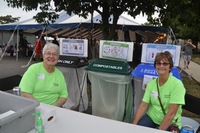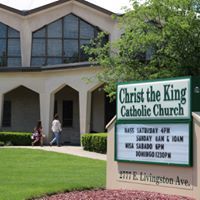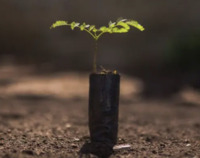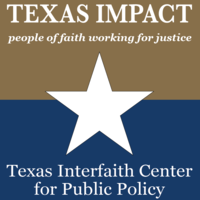Search
14 items
-
Congregational Profile: Our Lady of Perpetual Help, Grove City, OH: How it began in one parish
In 2016, prompted by Pope Francis’ encyclical “Laudato Si,” we at Our Lady of Perpetual Help Parish in Grove City, Ohio, held two 8-week sessions of discussions on the encyclical and at the end of the second session, our pastor, Fr. Daniel J. Millisor, appointed the discussion leader, Sister Nancy Miller, OSF as chairperson and called together a team to explore how the parish might lower our carbon footprint. The Creation Care Council (CCC) of our parish meets monthly for prayer, discussion and action in response to Laudato Si’s call for greater care for our common home.
We conducted a parish survey, with the intention of enhancing awareness among parishioners, as well as to determine if, and how, members were already incorporating recycling and composting into their daily lives. The results were highly, though not entirely, favorable. In addition to regularly inserting information and suggestions into our parish bulletins, taking the CCC members to tour a landfill, recycling plant, and the OSU Byrd Polar Research Center, we requested that all committees at the parish look at ways to reduce or eliminate their use of Styrofoam dinnerware. Rather than condemn polluters, we wrote thank you notes to businesses that showed environmental stewardship. We began annually purchasing and giving away seedling trees to plant on Earth Day. We took on trying to improve parish recycling efforts – providing new recycling containers for all parish offices, inviting a local official – an environmental expert – to explain to us what is and is not recyclable, preparing an interactive recycling quiz at the parish festival, and then attempting to bring recycling to the parish picnic and festival.
The efforts to incorporate recycling in parish events “failed” the first year, but we got it right the second year and this (the third) year, we successfully introduced food waste composting to Lenten Parish Fish Fry dinners, the Parish Picnic, and our largest parish event of the year: the Parish Festival. The 2019 Parish Festival served an estimated 5,000 meals, working with food vendors to increase their ability to serve compostable dishware and cutlery. In total, the CCC was able to divert 2,704 gallons of waste from the local landfill, which constituted 86% of all waste at the Festival.
We also exceeded all expectations in soliciting nearly 100 volunteers to help teach and monitor correct depositing of these materials - without tapping the usual volunteer corps that was still needed to keep the regular parts of the festival going. With the support of our pastor and dedicated CCC members, we’ve come a long way, and still feel like we have only just begun!
-
Bishop Hartley High School, Columbus, OH
Bishop Hartley has assembled a Care 4 Creation faculty committee, which focuses on long-term plans at the school. There is also a Care 4 Creation Association, which is for students and is also student-led. Instructors Rick Kohut and Ann Hawk have spearheaded some of the more long-term creation care projects there. Each have set up a vermicomposting bin in their classrooms, offering that it works well and is relatively low maintenance. Students from one of Rick’s classes had worked on a project where they created a poster/chart with pictures of endangered animals. Some of the students from Rick's classes engaged in the school's climate strike. One highly motivated student, Jamal, wrote a letter about the event which he sent to local politicians. Ann has been attending a yearly AEP Ohio energy efficiency program, and they in turn provide her with free energy savings kits for each of her students. AEP also offers energy saving kits for residential customers who are willing to complete their online Home Energy Profile. In addition, two new drinking fountains are about to be installed at the school that are designed to fill reusable water bottles. The school is also in the process of creating water bottles for sale with their school’s logo on them. The intent is to cut down on students and faculty purchasing and bringing in individual plastic bottles of water.
-
Engaged Organizations: The Catholic Foundation of Ohio - Columbus
The Catholic Foundation of Columbus, Ohio is designed to be responsive to interests that come from within the diocesan parishes and schools. To the extent that those interests have included creation care work, there has been grant activity. Dan Kurth, Director of Grants for the Catholic Foundation, offers that the foundation’s rubric for creation care initiatives is essentially: Does this project have any green energy sustainability pieces to it? The energy efficiency component of the foundation’s responsive grants is the main integration of a Laudato Si' principle into the foundation's grant work. As the Laudato Si encyclical has grown in awareness, more funding has become available as energy efficiency-related projects have become more commonplace over time.
The foundation has recently partnered with the Columbus Catholic Diocese on their Diocean Loan LED program, which has had considerable impact on diocesan savings. In addition, the foundation encourages schools to establish their own maintenance reserve funds in order to maintain more efficient operations. Specifically, there is a push to have schools and parishes upgrade their boilers, change over to LED lighting, and replace their windows with more efficient ones. -
Engaged Organizations: Christ the King Catholic Church, Columbus, OH
Jason Cervenec, Education and Outreach Director for OSU's Byrd Polar and Climate Research Center, has helped plan and carry out a number of initiatives for events and projects at Christ the King Catholic Church over the past few years. With the assistance of Deb Steele, the Volunteer Coordinator for Ohio Interfaith Power and Light (Ohio IPL), Jason has organized energy audits that were conducted by Ohio IPL programming and support. The LED retrofit with diocese Facility Director, Bruce Boyan, has been a noteworthy achievement at the parish as well. Additional energy efficient projects have included window replacement (also with Bruce) and the installation of an HVAC system. While the parish center is currently undergoing renovation work, Jason and other parishioners have reviewed the plans to look for additional efficiency and sustainability improvements. Recently, Jason had designed creation care bulletin inserts, with feedback from the Creation Care team at the Columbus Catholic Diocese, that have been widely circulate around town. The annual creation care information program that Jason initiated has garnered substantial support, with roughly 30 people in attendance each time. An additional work in progress project includes the installation of a bike rack station outside of the parish. -
Community Grower's Network
"The Community Growers’ Network is an initiative for Columbus-based Urban Farmers and Gardeners who steward a fresh food culture in their own neighborhoods. The Community Growers’ Network (CGN) focuses on communities which are food deserts/apartheids. The project is designed to build food system resilience by investing in the capacities of Urban Growers with various experience levels." -
Plant With Purpose
Plant With Purpose works to restore forests by planting trees in the most devastated and vulnerable parts of the world. They do this because they view the issues of global poverty and environmental damage as interconnected. -
Himalayan Institute
Founded in 1969 by the great teacher and humanitarian, Swami Rama, the Himalayan Institute acts on the basis of yoga tradition and Eastern spirituality. Through the living connection to an ancient wisdom tradition of the Himalayan Masters, and the guidance of spiritual head Pandit Rajmani Tigunait, the Himalayan Institute seeks to serve communities across the globe of those who seek to live their spiritual values. The institute provides resources for anyone seeking spiritual wellness such as yoga and meditation training, local retreats and seminars, and domestic and international excursions, frequently taking the form of a trek through the Himalayas. The Himalayan Institute strives for sustainable living in partnership with the community in Honesdale and also in their projects in India and Africa- providing sustainable living, jobs, and farming in several different communities. -
Columban Center for Advocacy and Outreach
The Columban Center for Advocacy and Outreach (CCAO) was founded in 1985 as the national advocacy office for the Missionary Society of St. Columban in the United States.
CCAO serves as the line of communication between Columban missionaries on the ground and policy-makers in Washington, D.C. Their mission is to work towards a more just, peaceful, and environmentally sustainable world by engaging in the political process guided by our faith and the Gospel. They work for structural change for the poor and marginalized populations Columbans serve around the world. Moreover, they advocate for policies and structures that bring society and the world into the right relationships with all of God’s Creation.
CCAO follows Catholic Social Teaching as their lens to engage in legislative advocacy and community engagement. -
AOHD (Archdiocesan Office for Human Development)
AOHD promotes activities concerning charity, integral human development, justice and peace within the Catholic Church's Kuala Lumpur Archdiocese. It operates under the purview of the AOHD Secretariat and Board of Management. -
Texas Impact and Texas Interfaith Center for Public Policy
Texas Impact exists to put faith into action. They equip faith leaders and their congregations with the information, opportunities, and outreach tools to educate their communities and engage with lawmakers on pressing public policy issues. They are an interfaith group that works together on issues such as racial discrimination, climate change, economic justice, and human rights that impact the most vulnerable people in our communities.
The Interfaith Center is Texas Impact’s 501(c)(3) research and education partner. The Interfaith Center’s board includes thought leaders; government affairs professionals; public servants; and communications experts. They provide the political insight and guidance that help Texas Impact offer clear, relevant, information that faith communities need to be effective advocates. -
Federation of Zoroastrian Associations of North America (FEZANA)
FEZANA is a non-profit religious group registered in the state of Illinois and formed to function as the coordinating organization for Zoroastrian Associations of North America. It serves as the coordinating body for 27 Zoroastrian Associations in the United States and Canada.
On this website, you can learn more about the community of FEZANA , Zoroastrianism, their sustainability reports and other social activities.
-
Green Umbrella Impact Team: Faith Communities Go Green
MISSION: Partnering with religious communities to create a more sustainable and equitable future for all by mobilizing their moral voice to reduce the risk of catastrophic climate change.
VISION: Religious communities collaborating to integrate care for creation in their lives and society. -
The U.S. Baha'i Office of Public Affairs
The Office of Public Affairs for the Baha’is of the United States was founded in 1985 to represent the American Baha’i community on the national stage.
Today, we collaborate with governmental and non-governmental organizations, individuals, and groups to advance thought around our focus areas, which currently comprise racial unity & justice, the environment, economic justice, human rights, the role of media in society, and gender equality & the advancement of women.
Our Office operates under the auspices of the National Spiritual Assembly of the Baha’is of the United States, the elected governing body of the American Baha’i community. -
ECHO Global Farm
ECHO introduces sustainable plants, climate-resilient techniques, and technologies to farmers around the world who are struggling to feed their families.
Through partnering with local NGOs, farmers, volunteers, and missionaries, ECHO is able to be efficient with their resources in providing aid where it's needed the most.
Empty bellies and empty hearts lead to pain and suffering for individuals, families, and communities across the world. ECHO believes that as active participants in the Great Commission and stewards of great agricultural knowledge, it is their duty to grow and make disciples.














